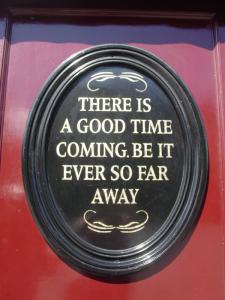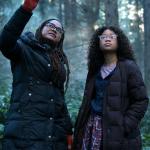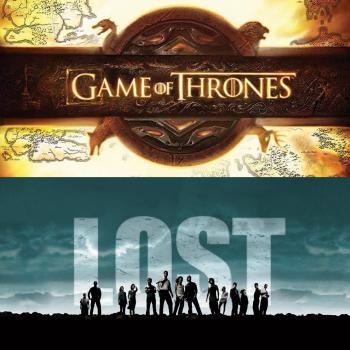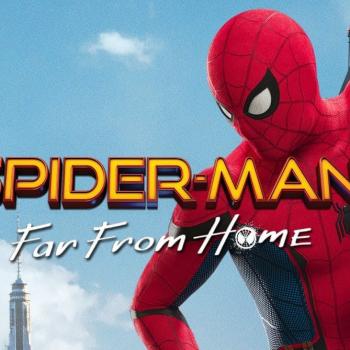 There’s something about growing up Irish American that settles deep in your bones. I don’t know when I first heard the bodhrán , but there was something in hearing that instrument that thrummed inside me in the way that Ravel and Mozart and even Andrew Lloyd Webber didn’t. It was primal. It meant I had to tap my toes. And I’m from New England, or that part of New England that takes the England part very seriously. I once saw an entire audience at a thousand seat theatre refuse to move when the fire alarm went off because the show was still going and we’d rather die than appear impolite.
There’s something about growing up Irish American that settles deep in your bones. I don’t know when I first heard the bodhrán , but there was something in hearing that instrument that thrummed inside me in the way that Ravel and Mozart and even Andrew Lloyd Webber didn’t. It was primal. It meant I had to tap my toes. And I’m from New England, or that part of New England that takes the England part very seriously. I once saw an entire audience at a thousand seat theatre refuse to move when the fire alarm went off because the show was still going and we’d rather die than appear impolite.
I don’t know when I first heard a reel, or how I learned the lyrics to “Johnny Jump Up.” We didn’t celebrate our Irishness – on both sides of the family – much more than an overboiled roast and a dry sodabread on St. Patrick’s Day. It was more that when I read the stories of Faerie, I knew they belonged to me and I belonged to them – in the same way I knew I would only ever be an enthusiastic voyager in reading Russian fairy tales, for instance. A long plaintive song, telling an epic story and sung only with the accompaniment of your own echo, felt right. There weren’t peat fires in my soul, but there were forests, and hills, and grass, and stones. There were skirts and tea and wildflowers in my hair.
There was, to a degree, an Ireland that no longer exists. Because the Ireland I’ve been handed ended in the 1800’s.
Because to be Irish American is to have the stories of Ireland stop the moment you stepped foot on Ellis Island.
Because the story of Irish Americans is a story of exile, and a home that no longer exists.
Stories from the Past
I’m the daughter of a genealogist, and grew up with a surgical understanding of my heritage.
My English ancestors go all the way back to nineteen years after the Mayflower, into the American Revolution, and the settling of Long Island. In America, I’m sometimes aware of my impressive pedigree and the fact that I can boast about how far back we go. (And that although my relative arrived in Salem, he was not there for the witch trials. Yet, how cool is it that I have to explain that! Because he could have been.) Growing up and loving all things British, Sunday nights were dominated by PBS: Mystery! and Masterpiece Theatre. And it’s little wonder that half my published novels and many of my most recent plays owe a huge debt of influence to my English forebears. Yet when I visited London, I felt still like a tourist: one of those many New England Colonials turned Anglophile, tolerated as the rascally younger cousins of my British tutors, very welcome – but not at home.
My German-Austrian-Swiss heritage is more recent to America, arriving a little before the first World War and as an escape from a troubled home. Studying in Austria, at the Steubenville-owned Kartause, I was struck by the beauty of my ancestors’ nation. The sense of space, the comfort of living snuggled in the mountains, the endless pine trees. And, apparently looking sufficiently Bavarian, I was addressed directly by many kindly Austrians who presumed I was One Of Them…and who then looked thoroughly confused when I had to apologize for not understanding them in my broken Germanish. They still gave me lifts home through the Alps, and checked to make sure I hadn’t sprained my ankle while I climbed the Alps, and pointed me towards an empty train car as we whizzed through the Alps, and offered me a cigarette when I got lost…in the Alps. Austrians are great. The Alps are tricky.
I have yet to visit Scotland (somebody finance the trip and I’ll tell you all about it), so I haven’t many details there. The bagpipes make me tear up and feel vaguely patriotic – although towards what, I’m not sure – but otherwise the heather on the hill and I are fairly unacquainted.
But Ireland.
Irish in America
My family, on both my mother’s and father’s side, roughly 75% of my heritage, come from all over the south and west and a bit in the heartland of Ireland, too. We grew up with stories about the passages on the boats, and the escape from the famine, and the stories that awaited the Irish when they came to Americae: stepping off Ellis Island and into the Civil War. Fighting for a cause that wasn’t theirs, but promised meals and clothes and a stipend if you survived. That “Irish need not apply.” That my great-great-grandmother had three fingers on her hand chopped off because of the mill where she finally got work. My Irish great-grandmother who married the Scottish Protestant boy – and had to elope to do so. Because the world was changing, and they were changing, too. About my grandmother trying so hard not to be Irish, while surrounded by New England WASPS – and how that translated into her sitting me down when I was seven and not letting me eat until I could hold a silver knife and fork, properly. How to “pass” for a New Englander with deep roots in the colonies, and not for a boisterous Irish lass. How to love Agatha Christie instead of Yates. How to sing Mozart instead of “Siúil a Rún.”
To be Irish was also to be Catholic. No matter how you covered up your Irishness, how much you hummed “Rule Brittania” – you were also Catholic. Defiantly Catholic. Rebelliously Catholic. You Can Take Our Country, and Starve Us Out, and Kill Our Tongue, and Make Us Flee – but you cannot Take Our Faith Catholic. To be Irish, to be Catholic, was to suffer and endure and sing sad love songs and mad, hopeful songs of war and failure and the glorious Long Defeat. And to beat up your enemies by still being there tomorrow, having reproduced like hell in the meantime. To be Irish, to be Catholic, to be American was to long for a home you’d never seen: in Heaven and on earth. It was to talk as fondly of St. Paddy as it was to talk of your uncle Paddy; and as natural to speak and know the story and shortcomings of both.
Had you asked me, I was a true daughter of the Emerald Isle…that is, until I visited home again.
American in Ireland
In 2006, I had just finished directing one of the most significant shows of my life, William Shakespeare’s Hamlet. The post-show depression I felt after that show was deep. (If you’ve never experienced being part of a significant play, imagine breaking up with the world, and then killing your mother, while the dust from Lewis’ Wardrobe sifts helplessly through your hands and all you’re left with is the memory of fire.)
My Mother, in her wisdom, sent my sister and I on a walkabout back to the homeland for a week. We arrived in Shannon, rented a car that drove on the wrong side of the road (while we were jetlagged, and staying awake by shouting along to “I’m Gonna Be (500 Miles)” by the Proclaimers). I’m not quite sure what I expected: more trees, for one. Ruins. More trees. Hedgerows and green, grassy hills, and thatch houses, and pubs. Maybe, if I’m being honest, a fairy. (Don’t judge me!) Sheep. I expected sheep. And at least one cliff. And a cross.
There were hedgerows. Terrifying hedgerows that hemmed in the winding streets too tightly and actually took off our sideview mirror by the end of the adventure. There were farms, and green, grassy hills, and thatch houses, and pubs, and sheep and cows besides, and a cliff that I was too tired to climb, and maybe no wayside crosses, but we saw a hidden altar stone or two. No fairies. And almost no trees. Fewer ruins than expected. And still: no trees.
It turns out, we discovered from some relatives that Mom sent us to visit, that the English had come and taken all the trees. The better to build ships to conquer the Colonies with. It made me think of the flagpole in the leafy New England town of Portsmouth where I grew up. They’d erected that flagpole and flew Betsy Ross’ flag from it, as a sign that the British would be taking no more of New Hampshire’s trees for their ships. So the British had gone back to Ireland and taken their trees instead. And I’d grown up with trees, and my ancestors hadn’t.
We visited many of our relatives, who showed us the old homestead, still standing, modernized only with indoor plumbing and a gas stove. We had tea with third cousins twice removed – so many cousins, so much tea. That when we finally arrived in Dublin, I pointed to the Golden Arches and said, “There, Julie. There, let us enter the embassy of our nation. Let us go into McDonalds and have a Diet Coke in defiance of all this damn tea!”
Yet even sinking our teeth into a processed burger, or later that night when we forewent a trip to the Guinness factory in favor of a little out-of-place Italian restaurant in Temple Bar, there was that same sense throughout the entire trip: that we didn’t have to do the touristy things, and eat “authentic” Irish food, because we were home. One of our cousins, earlier in the week, had rushed us through several tourist attractions which felt unnatural. We would have been glad – indeed, we were gladdest, when we could just wander and trip upon something small and insignificant and “ours.” Like mucking about in your house, rather than taking the grand tour. Let us kick off our shoes and enjoy no pretenses, and catch up with how you’ve been on this side of the Atlantic for the past 150 years.
Outside of the lack of trees, one of the most surprising and disheartening things to learn was how our Irish cousins had come to distrust or even hate the faith. While we Americans still fought for our right to be Catholic in a society that was largely suspicious of the church of Rome (we know how you feared Kennedy), the Irish having finally found some freedom seemed to be defeated. We made friends with the British, escaped the famine and survived. They stayed and watched themselves grow so desperate, their mouths were green from eating grass. They set off bombs for freedom; we built New York. They remember relatives who were taken out and beaten for being Catholic by the Black and Tans, while my Scottish Protestant great-grandfather welcomed child number five with his Irish Catholic wife.
This was home – but we had left home and prospered. They had stayed home, and barely survived.
Still, someone took out the bodhrán, and someone poured the tea, and someone knew how to dance, and someone else could sing, and the best way to beat your enemy was by being there tomorrow, even if you barely made it through today.
So, to all my Irish brothers and sisters, to all my ancestors and those cousins I’ve yet to meet, to those who crossed the ships, and to those who stayed for home, and to those who will come, and those still looking for a way into the fair and Faerie, I say:
Éirinn go Brách
_____
 Support the Pop Feminist for as little as $1/month! Become my patron on Patreon.
Support the Pop Feminist for as little as $1/month! Become my patron on Patreon.
Image courtesy of a lovely trip to Ireland in 2006.












